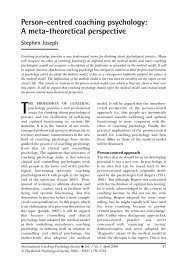Values, Virtues, and John Paul II - the St. Paul Center for Biblical ...
Values, Virtues, and John Paul II - the St. Paul Center for Biblical ...
Values, Virtues, and John Paul II - the St. Paul Center for Biblical ...
Create successful ePaper yourself
Turn your PDF publications into a flip-book with our unique Google optimized e-Paper software.
same could be applied to <strong>John</strong> <strong>Paul</strong>, though his purpose is radically at odds with that of<strong>the</strong> German philosopher. Pope <strong>John</strong> <strong>Paul</strong> does not leave his underst<strong>and</strong>ing of values opento misinterpretation. In his many addresses <strong>and</strong> writings he takes care to define exactlywhat he means by values, specifying <strong>the</strong>ir relationship to unchanging <strong>and</strong> objective truth.In <strong>the</strong> encyclical Evangelium Vitae, <strong>the</strong> Pope expressed this relationship within <strong>the</strong>framework of <strong>the</strong> common good: "It is urgently necessary, <strong>for</strong> <strong>the</strong> future of society <strong>and</strong><strong>the</strong> development of a sound democracy, to rediscover those essential <strong>and</strong> innate human<strong>and</strong> moral values which flow from <strong>the</strong> very truth of <strong>the</strong> human being <strong>and</strong> express <strong>and</strong>safeguard <strong>the</strong> dignity of <strong>the</strong> person: values which no individual, no majority, <strong>and</strong> no <strong>St</strong>atecan ever create, modify, or destroy, but must only acknowledge, respect, <strong>and</strong> promote."Besides specifying <strong>the</strong> relation of human <strong>and</strong> moral values to <strong>the</strong> truth of <strong>the</strong> humanperson, <strong>John</strong> <strong>Paul</strong> also makes clear that in <strong>the</strong> final analysis, values are grounded in GodHimself. In March 1985 <strong>the</strong> Pope wrote a letter to young people in which he stated,"Only God is <strong>the</strong> ultimate basis of all values; only He gives <strong>the</strong> definitive meaning to ourhuman existence." He added that "in Him <strong>and</strong> Him alone all values have <strong>the</strong>ir first source<strong>and</strong> final completion. . . . Without Him-without <strong>the</strong> reference to God-<strong>the</strong> whole world ofcreated values remains as it were suspended in an absolute vacuum."Along with allusions to values throughout <strong>John</strong> <strong>Paul</strong>'s writings, we find <strong>the</strong> term in o<strong>the</strong>rmagisterial documents as well. Nowhere is this more evident than in <strong>the</strong> Catechism of <strong>the</strong>Catholic Church, which contains numerous references to values, especially in <strong>the</strong> contextof marriage, <strong>the</strong> family, <strong>and</strong> Christian social doctrine. In <strong>the</strong> chapter on <strong>the</strong> humancommunity, <strong>for</strong> example, we read: "Society is essential to <strong>the</strong> fulfillment of <strong>the</strong> humanvocation. To attain this aim, respect must be accorded to <strong>the</strong> just hierarchy of values,which subordinates physical <strong>and</strong> instinctual dimensions to interior <strong>and</strong> spiritual ones."Those who feel uncom<strong>for</strong>table with <strong>John</strong> <strong>Paul</strong>'s use of "values" have done <strong>the</strong>ir best tominimize or nullify its importance. Some have denied <strong>the</strong> fact outright, such as <strong>the</strong>Catholic League's well-intentioned ad in <strong>the</strong> October 2, 1995 edition of <strong>the</strong> New YorkTimes, which stated that "<strong>the</strong>y speak about values, you speak about virtues." While <strong>John</strong><strong>Paul</strong> does speak abundantly about virtues, to say he doesn't speak of values is patentlyuntrue.O<strong>the</strong>rs have accused <strong>the</strong> Pope of superficiality, of not thinking through <strong>the</strong> consequencesof what he is saying. This is apparent in Allan Bloom's remark: "After Hitler, everybodyscurried back under <strong>the</strong> protective cover of morality, but practically no one turned toserious thought about good <strong>and</strong> evil. O<strong>the</strong>rwise our President, or <strong>the</strong> Pope, <strong>for</strong> that matter,would not be talking about values." But <strong>the</strong> insinuation that <strong>John</strong> <strong>Paul</strong> does not engage in"serious thought about good <strong>and</strong> evil" falls by its own weight. It is difficult, if notimpossible, to come up with anyone who thinks more seriously about <strong>the</strong>se topics than<strong>the</strong> present pontiff. His vigorous <strong>and</strong> cogent apology <strong>for</strong> <strong>the</strong> objectivity of <strong>the</strong> moral lawhas set <strong>the</strong> tone <strong>for</strong> Catholic moral <strong>the</strong>ology <strong>for</strong> <strong>the</strong> close of this millennium <strong>and</strong> <strong>the</strong> birthof <strong>the</strong> next.



